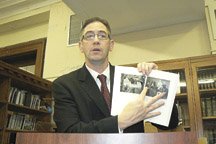Bertha Arnold lived a quiet life in Jersey City from the time she emigrated from her native Germany with her three sons in 1883 to the time of her death in 1911 at age 59.
But her local neighbors and even some of her family members didn’t know about her background: She was actually Engelbertha Krupp, who had been born into Germany’s wealthiest family.
This wife of a shoemaker and saloon owner lived a relatively quiet life in Hudson County. The secret remained for over 130 years, but now it has been revealed in her great-grandson David Stroebel’s new book, “The Cannon King’s Daughter: Banished from a Dynasty, The True, Untold Story of Engelbertha Krupp” (255 pages; Lulu.com).
“She was done wrong in a big way.” – David Stroebel
________
The book recounts how Engelbertha Krupp, the first child and the only daughter of German industrialist Alfred Krupp and his wife Bertha, disobeyed her father’s wishes by marrying John Joseph Stoebele, a mere worker on the Krupp estate in Germany.
The fallout affected not just the family, but history.
Engelbertha and her husband went on to raise their three sons, John Jr. (David Stroebel’s grandfather), Otto, and Adolph, in Jersey City. They were disinherited from the family fortune. Her brother Friedrich received the entire inheritance and did not share it with his sister.
Engelbertha was even erased from the Krupp family history, as subsequent chronicles about the family list only one child.
Stroebel hopes the book will encourage keepers of the Krupp Archive in Essen, Germany to come to the United States and interview remaining living family members, to further verify the revelations in the book – as well as something more important.
“While my grandmother didn’t get her inheritance, I am not looking for money but rather for her rightful place in Krupp family history to be restored,” Stroebel said. “She was done wrong in a big way.”
The wealthiest person in Jersey City
Engelbertha Krupp may not have gotten her fair share of the inheritance, estimated at $7 billion, according to Stroebel’s research – but she did not leave her homeland completely penniless. The family gave her $10,000 in gold and silver coins and jewelry.
Stroebel said that the award allowed Engelbertha and her family to live a comfortable life. By today’s standards, the $10,000 would be the equivalent of $200,000.
They settled down at 356 Palisade Ave. in the Jersey City Heights, then an enclave of a large German population.
“She may have been the wealthiest person in Jersey City, maybe even in the state,” said Stroebel at Monday’s reading.
That’s just some of the information Stroebel unearthed from various relatives during his inquiry into his family’s background.
Dark corner of history
The book reveals that her brother Friedrich would end up siring two daughters, one of whom gave birth to Alfried Halbach, who used slave labor from the Auschwitz concentration camp to work in Krupp factories. The factories manufactured the bulk of the firepower and war machinery used by the Nazis during World War II. After the war, Halbach was convicted by the Nuremberg Tribunal and sentenced to 12 years in a German prison, where his distant American cousin, Lt. Otto “Dave” Stroebel (the author’s uncle), was the warden.
Stroebel said the book has made him consider writing another book about his family. Stroebel also referred to himself as an “accidental author,” but not just because of his first-time status as a writer. It’s also because he only began looking into his family tree after an aunt died from injuries suffered in a long-ago car accident.
Ricardo Kaulessar can be reached at rkaulessar@hudsonreporter.com.
